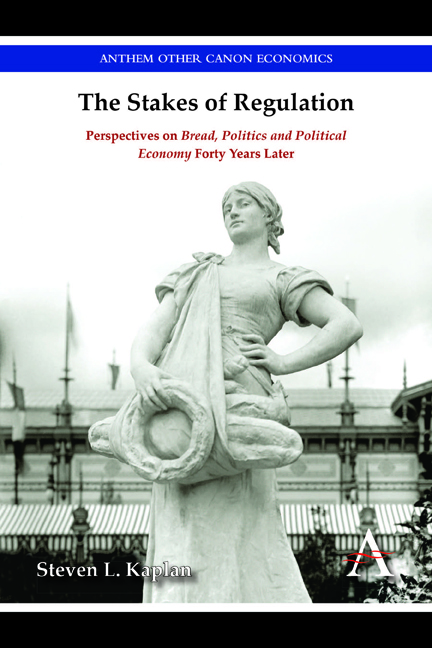Book contents
- Frontmatter
- Dedication
- Contents
- Introduction
- Chapter I (Re-)Thinking Regulation: Police, Prices, Markets
- Chapter II Agriculture and the French Economy of the Old Regime
- Chapter III Collective Action and Its Actors: The Moral Economy and the Market, the People and the Elites, Disorder and Order
- Chapter IV The Parlements in the Age of Economic Enlightenment
- Chapter V Kings and Ministers: Politics and Policies, Finance and Subsistence
- Chapter VI The New Historiography of Political Economy
- Chapter VII Famine, Dearth and Food (In-)Security
- Afterword
- Index
Chapter II - Agriculture and the French Economy of the Old Regime
Published online by Cambridge University Press: 20 July 2018
- Frontmatter
- Dedication
- Contents
- Introduction
- Chapter I (Re-)Thinking Regulation: Police, Prices, Markets
- Chapter II Agriculture and the French Economy of the Old Regime
- Chapter III Collective Action and Its Actors: The Moral Economy and the Market, the People and the Elites, Disorder and Order
- Chapter IV The Parlements in the Age of Economic Enlightenment
- Chapter V Kings and Ministers: Politics and Policies, Finance and Subsistence
- Chapter VI The New Historiography of Political Economy
- Chapter VII Famine, Dearth and Food (In-)Security
- Afterword
- Index
Summary
The publication of Bread, Politics and Political Economy coincided with the eclipse of the grand doctoral thesis in France, the onerous yet fecund apprenticeship, sometimes extended till midlife or beyond, often marked by a provincial exile (or retour aux sources: it depended on one's frame of mind and ambition), which generated massive works, occasionally as prodigious in their influence and prestige as in their size. In particular, the age of the magnificent regional peasant studies was over. These were the studies most likely to touch directly on agricultural production/productivity. In this domain, they yielded highly disparate results, in part because of differences in the quality and quantity of sources and in methods of analysis and interpretation. And, in any event, they spoke to regional specificities that did not necessarily result in fruitful comparisons or findings that could be extrapolated to a broader scale (as the English are more willing to venture). Scholars such as E. Le Roy Ladurie, P. Goubert, G. Lefebvre, P. de Saint-Jacob, P. Bois, R. Baehrel and others dazzled us with the vivid reconstitution of rural life and the “structures and conjunctures” of the countryside, but did not resolve the question of agricultural output. Nor did the less numerous yet immensely informative theses on the nobility—joining, in extremely variable relations, seigneurs and peasant, both highly diverse—fill this gap.
The synthetic works that followed often took as their framework the “ni-ni” formula that flourished in French politics: neither demographic nor agricultural revolution. It was reassuring to know that there was no demographic revolution, whatever that signified precisely (though we learned rather quickly that population growth was nevertheless quite brisk during the eighteenth century) because it would have proved challenging to explain how the society nourished this (implicitly) huge human surplus. The absence (or, rather, exasperating tardiness) of an agricultural revolution led scholars to focus on the negatives: obstacles, barriers, blockages, bottlenecks, contradictions, and incoherences of a social, psychological, ideological, political, juridical or administrative as well as an economic nature that penalized (or mutilated) the primary sector. Scholars discussed notions of an immobile ecosystem spanning several centuries, of an extremely fragmented agricultural map that revealed a handful of regional champions and a host of dwarves, and of agronomic innovation on the margin (or in the salons and experimental cabinets).
- Type
- Chapter
- Information
- The Stakes of RegulationPerspectives on Bread, Politics and Political Economy Forty Years Later, pp. 61 - 94Publisher: Anthem PressPrint publication year: 2015



